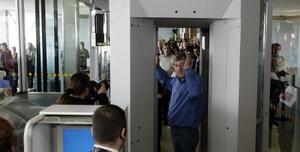Europe skeptical about whole-body scanners
Questions are being raised in several European countries about the effectiveness, cost effectiveness, health, and privacy aspects of whole-body scanners; a former head of security for the British Airports Authority: “A thorough body frisk would do the same sort of thing, if it is done properly, and of course it costs a lot less”

Full body scanner in use // Source: rnw.nl
Umar Farouk Abdulmutallab’s plot to bring down a Detroit-bound airliner on Christmas Day was a game changer. As a reluctance to introduce body scanners at airports eases, two countries deploying them nationwide this month include Britain, reportedly a key setting for the Nigerian student’s radicalization, and the Netherlands, where Abdulmutallab passed through undetected before boarding a flight to the United States.
ABC News’s Ben Quinn writes that ardent opposition to these scanners — including in the ranks of Europe’s bureaucratic elite – may yet frustrate their international rollout. Beyond campaigners who worry about supposed health risks or view them as the digital equivalent of a strip search, many European aviation-security experts remain unconvinced of the cost benefits.
Frisking, they say, is much less costly. “A thorough body frisk would do the same sort of thing, if it is done properly, and of course it costs a lot less,” says Norman Shanks, a former head of security for the British Airports Authority, the U.K.’s leading airport operator, who cautions that the technology is being viewed as a “panacea.”
“Scanners also take up a lot of space. So, I hope that they will be used selectively, and restricted to a percentage of people. Otherwise, there will be long queues.”
In the United States, where around 40 machines are in use at 19 airports, the Transportation Security Administration (TSA) spent $25 million buying another 150 in September. DHS Janet Napolitano said on 7 January that there would be an “acceleration” involving the introduction of a further 300.
A privacy group, though, accused the TSA of misleading the public with claims that scanners would not store or send their graphic images. The Electronic Privacy Information Center produced TSA documents from 2008, obtained under a Freedom of Information Act lawsuit, in which the administration specifies that the scanners must have the ability to store and send images. The TSA responded by saying that this was for test purposes and the machines would be delivered without those capabilities.
Plans in Europe face more serious hurdles, not least the opposition of the European Commission’s incoming justice commissioner. Passengers “must have the option of undergoing a body search,” says Viviane Reding, who is to take up her powerful portfolio later this month. She could draft a law ruling out mandatory body scans at airports, but has stopped short of saying she will.
Quinn writes that privacy concerns have meant only a tentative embrace of